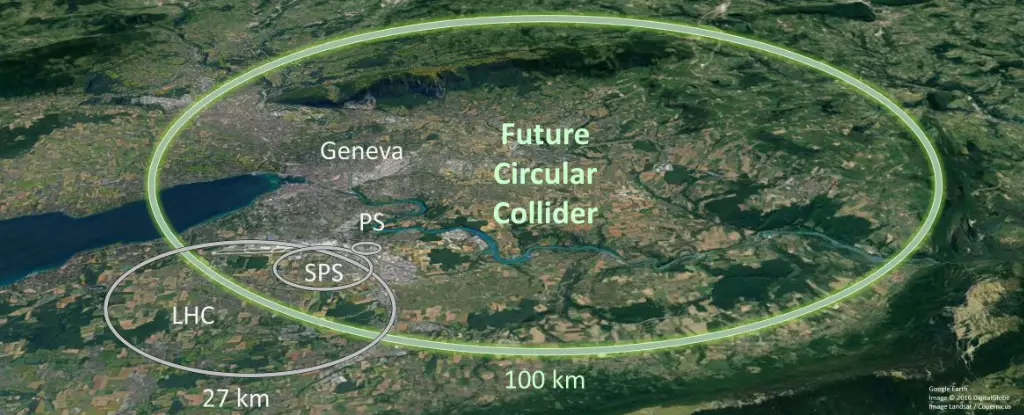In an era where scientific advancement often seems synonymous with grandiosity, the Future Circular Collider (FCC) project proposed by CERN stands out as a towering ambition—both literal and metaphorical. Touted as the world’s largest particle collider with an eye-watering budget of $17 billion, the FCC aims to outshine its predecessor, the Large Hadron Collider (LHC), which has already earned its place in the annals of physics history. CERN Chief Fabiola Gianotti has firmly stated that the construction and operational capabilities of the FCC have been greenlighted by preliminary assessments, promising a glimmer of hope for a scientific renaissance in our understanding of the universe. Yet, amid the symphony of support, dissent lurks, revealing a complex tapestry of concerns that questions the project’s wisdom.
A Battle of Philosophies: Science vs. Environment
The conflicting views surrounding the FCC unveil a fascinating juxtaposition. Gianotti’s assertions seem compelling against the backdrop of global competition in foundational physics—especially rival nations like China. However, when one moves through the conversation, particularly into the ecological and ethical realm, a dissonance emerges. Critics like physicist Olivier Cepas urge the scientific community to reconsider where we are allocating our resources. The question arises: should we be heralding the FCC’s colossal potential or scrutinizing its staggering environmental impacts, astronomical energy consumption, and hefty price tag?
On the ecological front, environmental groups have emerged as vocal critics. Organizations such as WWF and Greenpeace are vehemently opposing the FCC, articulating concerns that extend beyond financial misgivings to include potential disruptions to local ecosystems. A critical report from the environmental association Noe21 labels the project as excessive, begging the question of whether monumental advances in fundamental physics justify the ecological costs associated with this immense venture.
Local Voices: A Ground-Level Perspective
Meanwhile, the sentiments of individuals directly impacted by the FCC’s proposed construction cannot be overlooked. Local farmer Thierry Perrillat’s distress about losing agricultural land to an endeavor he views as a Goliath against his own David demonstrates a palpable human cost often overlooked in discussions dominated by high-minded scientific debate. It is essential to bring these localized voices into the larger dialogue, as their quality of life, livelihoods, and environmental stewardship must not be sacrificed at the altar of ambitious scientific inquiry.
In Ferney-Voltaire, where one of the proposed sites sits, local leaders have communicated a so-called win-win narrative, arguing that the FCC could stimulate local economies and provide excess energy for community initiatives such as heating homes. However, this perspective simplifies a complex issue, reducing the local populace’s nuanced opinions to a singular notion of collective gain. When considering a project of such magnitude, it’s vital to ask if immediate financial benefits can genuinely outstrip the long-term costs to both the environment and local communities.
The Dilemma: Innovation Versus Social Responsibility
As much as the narrative aims to celebrate innovation, it should also deeply commit to social responsibility. This venture demands heavy investment, not just in terms of funding, but also in its implications for communities and the environment. The FCC’s pursuit of the ultimate truths in particle physics serves a noble purpose, yet one must ponder whether this endeavor stands on an ethical precipice.
In recent public meetings concerning the FCC project, such as those in Marcellaz, concerned citizens discovered the depths of ambition cloaked in the promise of scientific progress. While many appreciated the importance of advancing our grasp of the universe, the undertones of uncertainty regarding the project’s overall practicality loomed large. All too often, the allure of groundbreaking scientific discovery can overshadow pressing realities, compelling scientists and policymakers to prioritize an ambitious vision over the harsh truths of today’s socio-political landscape.
Ultimately, the FCC maelstrom compels a deeper analysis: are we shaping the future of science, or are we burdening ourselves with a chimera that may well remain elusive? As scholars and politicians engage in the battleground of facts and figures, let us not forget the collective responsibility we have to each other and to our planet. The future must be built not only on aspirations but also on sustainable and equitable foundations that champion humanity rather than science alone.


Leave a Reply